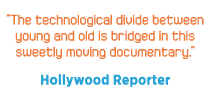“Could you explain about this thing called Facebook and having to be a friend?” asks a bewildered-looking older woman of Max. A cute, fresh-faced youngster, Max is trying to recruit residents of a Toronto retirement home for Cyber-Seniors, a program that will tutor them on how to use the Internet and that is the subject of a new documentary feature film.
“People can log on and join and add each other,” Max tries to explain to the home’s senior residents. He’s met by blank stares, but keeps going. “Facebook calls them friends but other people call them profiles, so you add a profile – it makes it simpler to say add a friend – so once you sign up you become a friend and if someone wants to add you they click add a friend, or you add them as a friend and they join and it just connects.”
Not surprisingly, the crowd continues to greet Max with a complete lack of comprehension.
While it’s sure to get some laughs, this scene from “Cyber-Seniors” highlights how hard it is to explain the intricacies of a totally alien technology to someone who has no idea how to turn on a computer. One Cyber Senior student, Annette Rapoport, remembers how she used to be so in the dark that she actually picked up the mouse and moved it over her head to go from left to right on the screen.
Nonetheless, the hunger to connect and learn new things enticed 40 people, most of them over 80 and many over 90, to spend two sessions a week with high school students who came to their homes to teach them how to surf, email, and more.
Cyber-Seniors was launched by 16 and 18 year old sisters Macaulee and Kascha Cassaday, both Toronto high school students, who were inspired to bring the Internet to computer-illiterate seniors after seeing how it had transformed their grandparents’ lives. The sisters developed a training manual and recruited their friends as teachers. Their eldest sister, Saffron and their mother, Brenda Rusnak, who had worked with seniors as a physiotherapist, decided to team up and make a documentary of the project. Over the next ten months Cassaday and Rusnak shot 120 hours of footage, which became the Cyber-Seniors documentary.
“The point of the program was to help older people enter the digital age,” Cassaday says. “People aren’t living in communities anymore. Technology is replacing community. That was the focus of the film.”
Rapoport, who is one of the more enthusiastic students, agrees: “I’m on Facebook with my grandkids and I’m learning to send photos, but not quite yet. I’m very social – any information I want to get, I pick up the phone and call. But since this program I have been using email to get in touch.” Rapoport is about to get a tablet and is looking forward to the convenience of using it.
Although the film focuses mostly on seniors’ interest in using the Internet to connect with family, Cassaday stresses that becoming computer literate has other benefits for seniors, too, such as online shopping and banking for the homebound, and for finding medical information. And outtakes from the film on YouTube show some students being more adventurous online than the film suggests: One woman talks about how amazing it was to find her childhood home on Google Earth.
“Cyber-Seniors” puts a humorous and optimistic spin on the challenges that the program’s seniors faced, but not everyone stuck with the program. While all of the students featured in the film are still online, about half dropped out. Kascha Cassaday says that “they go for a couple of lessons and see it’s kind of hard, then say I don’t need this and give up. It’s easier to give up than to keep trying.”
That harsh assessment from a teen points to how difficult it is for the young to be patient with the old. Rapoport says giving up is less to do with a lack of interest and more about the frustration of not knowing what to do when you can’t figure something out or the computer doesn’t work and your tutor isn’t there to help.
Who got the most out of the program? Rapoport says it has been as beneficial to the tutors as to the seniors. “They had to learn to be patient. These kids are proficient with computers, but patience is another important skill they need to learn.”
Cyber-Seniors continues to operate in the two homes where the documentary crew filmed, and the program – or movement, as it calls itself – now offers its resources online to would-be teen tutors as well as to organizations seeking to start similar programs.
Click here to visit the Cyber-Seniors Documentary website and here to see more videos from the filming.
Read this article online here.






